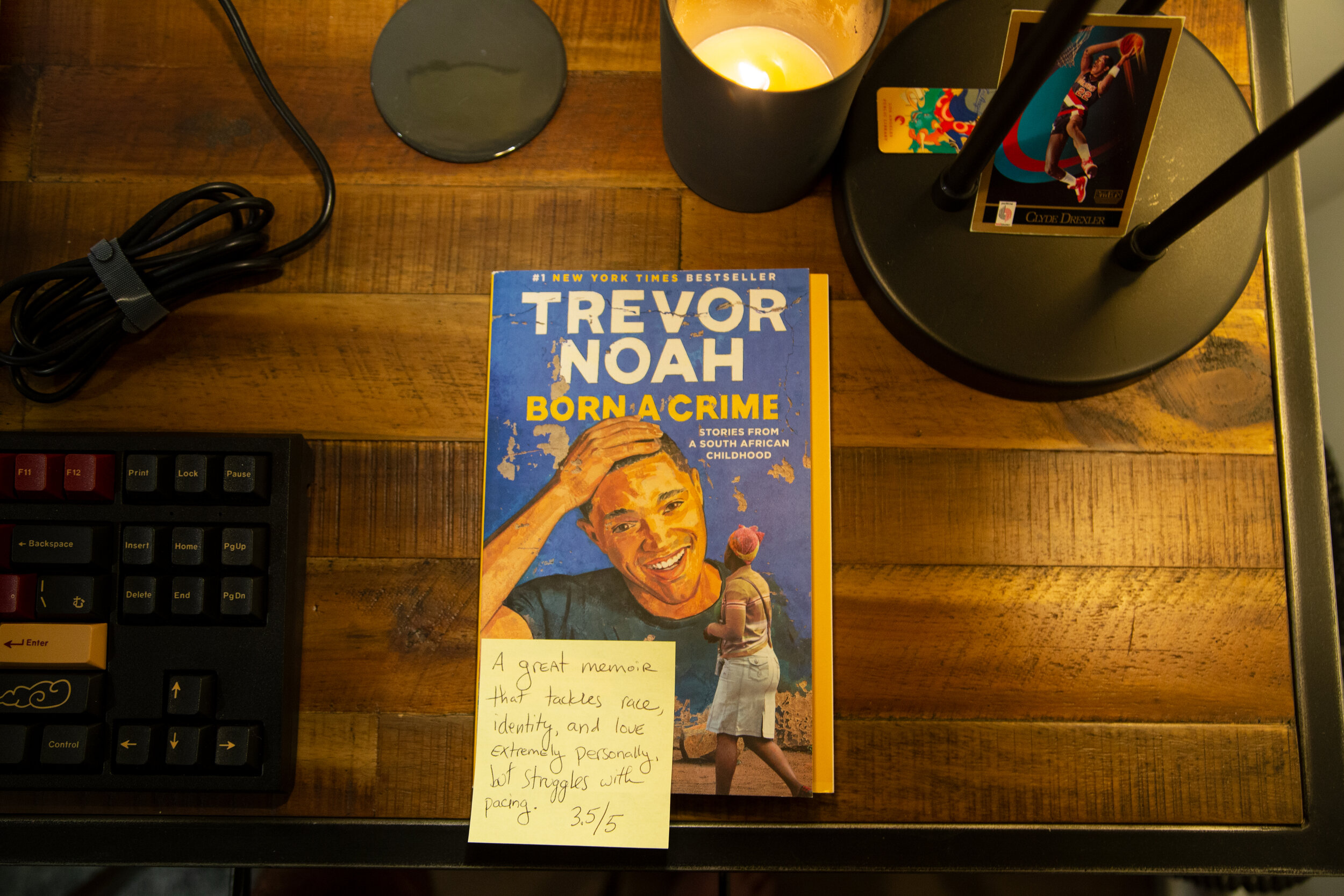Growing Up is Tough
Born a Crime is a good memoir, and in some places, it’s really good. You should read it. There are insights in it that only Trevor Noah would know about. I think when he talks about his mom or his identity, the writing is at its best. Noah proves to be not only an intelligent comedian, but also an intelligent and thoughtful writer. It does run into a couple of pacing/chapter placement problems.
The memoir takes place during his most formative years in South Africa, and doesn’t touch much on his roots as a comic, it mostly stays away from his comedy career, with only one or two references to his career taking off and things like that. Noah uses the chapters to mostly tell singular stories from his youth, with some overlapping characters, mostly family members. His school friends or work friends mostly come and go with the chapters. These chapters are also preceded by their own ‘prologue’ where Noah makes a point that probably wouldn’t fit in the chapter naturally, which I think is a strength for the writing. It helps an audience that might be ignorant of the complex political and social climate get on board with the story Noah is about to tell.
The memoir is presented as “stories from a South African childhood”, and the memoir fulfills that promise. More than that though, it is about a mother who will do almost anything for her son (except let him stay home from church). About 90% of the stories told involve Noah’s mom in some way, and that’s a good thing. For one, she is an interesting character: fiercely independent, ran away from home, lived in a predominantly white area, had a mixed son on purpose. She is a dynamo of a person, and is really the star of this book. Not only is she an interesting character, it is also clear that she is the one most influential person in Noah’s life. Every aspect of his character can be related back to her in some way. Her love for him is biggest theme of the book.
The stories also involves other themes, including identity and fitting in. One scenario that keeps coming up is: where should Trevor Noah sit? At school, at lunch, and even in jail, Trevor is presented with this dilemma. Because of where he is and what his skin color is, the answer is never cut and dry, and of course, the answer depends on the situation. Noah does a great job explaining why things are the way that they are, why he can fit in here or why he should hang out with those kids at lunch, etc, etc. It’s a smart writing tool, I think. He takes a common enough scenario - who hasn’t been the new person somewhere, and not known where to sit? - and turns it on its head multiple times. He can’t sit with them because he’ll be too white, and he can’t sit with them because he’ll be too black. Then he can’t sit with them for another reason, and he can’t sit with them for another, different reason, on and on.
This memoir is at its best when Noah strays away from his comedian roots. His writings about his mother, and where he fits in in South Africa’s Post-Apartheid world are the most real and illuminating. Of course, I understand why he needs to include stories of him taking someone to the prom, or shoplifting. The reader needs time to catch their breath before another big emotional beat, but It almost felt like two different people were writing this book. Trevor the Comedian, and Trevor the person. I know enough about the comedian, so I was more drawn to the person.
The biggest problems I had were more editorial than story based, but they were still jarring. At least three times we were introduced to a character in one chapter, then in the next chapter we are re-introduced as if we had never met this character before. Another editorial issue is the amount of time jumps that take place. For the most part, the stories take place from the time Noah was around 4 or 5 to his early 20s. The problem seems to be that the book was written chronologically, and then some chapters were cut and pasted in other parts of the book. This might’ve been to separate the book into themes rather than chronology, but it comes off as confusing. Instead of knowing where all of the players are on the field, I found myself without orientation at the start of each chapter. The best example I have of this is near the beginning of the book, when Noah goes to visit his father. He’s 24 at this point, and everything that has or will happen in the book has already happened to him. So it was confusing to go to essentially the end of the story when I’ve only read a third of the pages, if that makes sense. Noah also likes to mention something, and then tell the reader that he’ll come back to it later. This would be fine in a normal, chronologically straightforward book, but the fact that it isn’t leads to some more confusion.
Overall, this is a great memoir about one of the most interesting comedians out there, with gripping and insightful stories that is marred by confusing pacing and issues with context. It’s still worth a read because the parts that are good are home-runs, and the errors are really foul-tips, not strikeouts.
This memoir is a 3.5/5. Think the TJ McConnell game vs. Boston.

